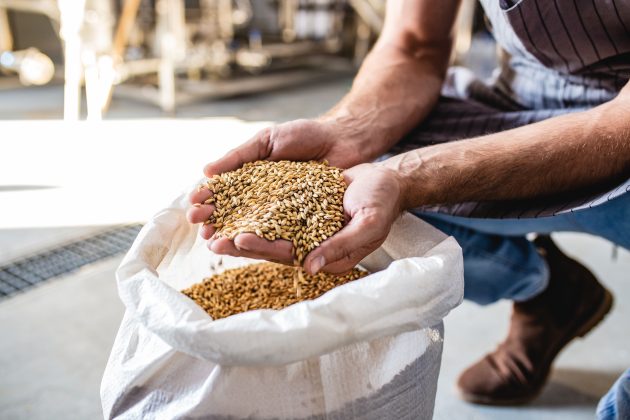
Bringing new life to traditional malting methods
By Lilian Schaer for Canadian Food Innovation Network
Food Safety Research & Development Beverages Grain & Oilseed Milling 2 Crows Brewing Canadian Food Innovation Network Dalhousie University Editor pick Food innovation Nova Scotia Propeller Brewing Photo © Izusek/ Getty
Photo © Izusek/ Getty Canada’s craft brewing industry has grown significantly in recent years as consumers increasingly embrace local food and beverage production. That has also led to more demand for local craft malt – barley that’s partially germinated and then dried for use in brewing.
“There’s a demand for locally-sourced craft malt, produced in a small system and in local production; it feeds into the ethos of what craft brewing represents,” says Dr. Alex Speers, Professor of Brewing Science at Dalhousie University.
Historically, malting involved soaking barley in water, laying it out on the floor to germinate, and then drying it. This is a process called floor malting. Today, pneumatic malting is automated with large maltsters spreading the barley out on a perforated floor and blowing air through that floor to precisely control temperature and humidity before drying the malt.
Two concerns about floor malted barley have been hindering the growth of craft malting: the potential for higher levels of a flavour-altering compound called Dimethyl Sulphide (DMS), and a condition called premature yeast flocculation where yeast clumps early and falls out of the fermenter before the beer is completely fermented.
“We wanted to look at the differences between craft and pneumatic malting to address rumours in the brewing industry about these potential problems,” says Speers. “There’s very little available in the literature about this, so we wanted to try to get a better understanding of DMS and premature yeast flocculation before launching into other craft malt projects.”

Photo © Blackcat/Getty
With project funding from the Canadian Food Innovation Network (CFIN) Emerging Science Research Cluster, Speers partnered with two Nova Scotia breweries, 2 Crows Brewing Company and Propeller Brewing Company, to find answers. The goal was to test the suitability of different Canadian barley varieties to floor malting and determine whether there was any truth to industry-held perceptions about the traditional process.
Three graduate students worked on the project with Speers looking at DMS, the yeast issue, and also the potential for fungal growth in floor malted barley.
Although the fungal growth component of the project is still underway, the research team found no problems with the other two components, potentially enabling broader use of craft floor malt by craft brewers.
“This is good for the industry. It gets rid of some of the myths, like that craft malt has high levels of DMS, which is not always the case,” notes Speers. “We also didn’t see premature yeast flocculation in the study we did, so brewers and maltsters can rest a bit easier on that front as well.”
For Jeremy Taylor of 2 Crows Brewing, the results open up new product development opportunities, as well as the possibility of sourcing more local ingredients for their products that are already on the market. The young Halifax brewery has made supporting small, local producers a big part of its identity.
“There’s been a real rise in small scale maltings including a traditional floor malting resurgence, and we’ve been trying to figure out how we as a brewery can support those smaller producers,” Taylor says. “For us, the main goal of the project was looking at whether flavour would be a problem with floor malt compared to conventional malt and we now know it’s not really an issue.”
The cluster funding was critical in making this research a reality; a project of this scale would’ve been beyond the resources of a small start-up brewery. An added benefit for Taylor has been the opportunity to work with Speers, a world-renowned expert in the field of brewing science, which also wouldn’t have been possible outside of the research project.
“For us as a (beer)producer, it really has opened up the avenue of being able to use some of this smaller, locally produced malt,” Taylor adds.
Through the project, Speers’ three graduate students were each able to gain valuable industry work and research experience, making them very employable in an industry constantly in search of skilled workers.
“This type of collaboration between industry and academia is also great for students because it exposes them to jobs in the sector and gives them valuable training and experience,” adds Speers. “All three students from this project have gone on to good industry jobs since.”
Why is this innovation important?
- Dispels common myths about floor malted barley
- Creates new opportunities for craft brewers and maltsters
- Supports local economic growth
What does this project mean to Canada’s food processing industry?
This research dispels commonly held industry myths about floor malted barley, opening up new market and product development opportunities for both craft maltsters and brewers.
About 2 Crows Brewing Co.
2 Crows Brewing Co. is a small craft brewer based in Halifax, Nova Scotia. The company, founded in 2017 by Mark and Kelly Huizink and Jeremy Taylor, brews a wide range of craft beers with a focus on creating quality, local product.
About Propeller Brewing Co.
Propeller Brewing Co. has been brewing craft beer in Halifax, Nova Scotia since 1997. Founded by John Allen, the company is the city’s oldest craft brewery.
About the project team
Dr. Alex Speers is a professor in the Department of Process Engineering and Applied Science at Dalhousie University where he specializes in brewing science. He’s also an Honorary Professor at the International Centre of Brewing and Distilling at Heriot-Watt University in Edinburgh and completed both his master’s and PhD at the University of British Columbia.
Jeremy Taylor is the co-founder and head brewer at 2 Crows Brewing in Halifax. He’s a graduate of the University of British Columbia and completed a Master’s in Brewing and Distilling from Heriot-Watt University in Edinburgh under Dr. Speers.
The Canadian Food Innovation Network Emerging Science Research Cluster is funded in part through the AgriScience Program under the Canadian Agricultural Partnership, a federal-provincial-territorial initiative. For more information, contact Laura Sider, science co-ordinator, CFIN.
Print this page